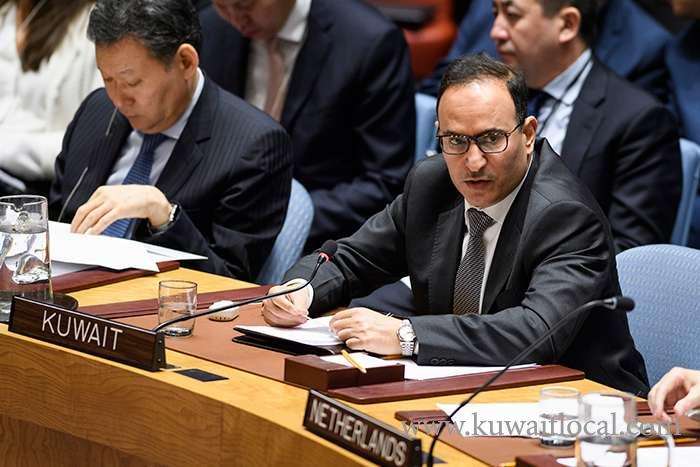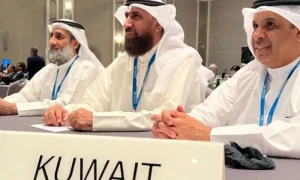Latest News
- Court Sentences Bank Employee To 5 Years For Embezzling 100,000...
- Fake ‘Sheikh’ Sentenced To 2-yr As Court Overturns Verdict
- Justice Ministry New Service On The Sahel App
- Ministry Probes 68 Cases Of Illegal Charity, Funds Collection
- Globally, Kuwait Is Among The Top Consumers Of Incense And Oud O...
- Decrease Seen In Foreign Investment
- Kuwait Customs Seized 2 Containers Laden With Tobacco At Shuwaik...
- Unpaid Salaries, Accountant Beaten Up By Workers
- The Sahel App Was Not Hacked, A Spokesman Claims
- Four Expats Arrested For Stealing Copper Cables Worth 60,000 Din...
- Indian National Died In Abdalli Car Accident
- Work Permits And Foreign Worker Transfers Are Amended By PAM
Unsc Permanent Members Should Not Use Veto In Case Of Atrocities

Kuwait Representative to the United Nations said the recent events had proven, ever more starkly, that the use of the veto by permanent members of the Security Council should be prohibited "in cases of mass atrocities committed against civilians."
In his address to the Council meeting on the Middle East on Friday, Ambassador Mansour A. Al-Otaibi urged the parties to the Syrian conflict to comply with the provisions of the international humanitarian law and the relevant UNSC resolutions, including the Resolution No. 2118.
Calling for intensified efforts to push forward the political process aimed at peacefully resolving the conflict in Syria, he echoed the disappointment of the UN Secretary-General Antonio Guterres over the Council's inaction and his calls for the establishment of a new mechanism to investigate allegations of chemical weapon use and ensure accountability for perpetrators.
Calling on the Council to continue to work to establish such a body, he underlined the need for it to be totally independent, impartial and transparent.
"Kuwait supported the League of Arab States' position in backing Syria's sovereignty, territorial integrity and independence," he said, urging all parties to redouble efforts to reach a peaceful negotiated settlement to the conflict.
He also condemned the illegal Israeli occupation and its long-standing acts of oppression against the Palestinians, saying its occupying forces must not be exempt from international law. In an earlier statement to the session, the UN Secretary-General said the situation in the Middle East is in chaos - to such an extent it has become a threat to international peace and security.
"The region is facing a true Gordian knot - different fault lines crossing each other and creating a highly volatile situation with risks of escalation, fragmentation and division as far as the eye can see with profound regional and global ramifications," he said.
"We see a multiplicity of divides. The first is the memory of the cold war. But, to be precise, it is more than a simple memory. The cold war is back - with a vengeance, but with a difference.
"The mechanisms and the safeguards to manage the risks of escalation that existed in the past no longer seem to be present. "Second, the Palestinian-Israeli divide. Third, the Sunni-Shia divide, evident from the Gulf to the Mediterranean.
It is important to note that apparent religious divides are normally the result of political or geostrategic manipulations, the Secretary-General added.
SOURCE : KUNA
Trending News
-
 Eid Al Fitr 2024: Crescent Moon Not Sighted In Sau...
08 April 2024
Eid Al Fitr 2024: Crescent Moon Not Sighted In Sau...
08 April 2024 -
 Kuwait Implements Home Biometrics Services Ahead O...
14 April 2024
Kuwait Implements Home Biometrics Services Ahead O...
14 April 2024 -
 When Will Eid Al Fitr 2024 Take Place In Qatar, Ba...
08 April 2024
When Will Eid Al Fitr 2024 Take Place In Qatar, Ba...
08 April 2024 -
 On Sunday, The Meteorological Department Warns Of...
07 April 2024
On Sunday, The Meteorological Department Warns Of...
07 April 2024 -
 Kuwait Airways Provides Update On Flight Schedule...
14 April 2024
Kuwait Airways Provides Update On Flight Schedule...
14 April 2024 -
 Gathering For Eid Al-Fitr Prayers: Kuwaiti Citizen...
10 April 2024
Gathering For Eid Al-Fitr Prayers: Kuwaiti Citizen...
10 April 2024 -
 Winners Of Kuwait National Assembly 2024 Elections
06 April 2024
Winners Of Kuwait National Assembly 2024 Elections
06 April 2024 -
 Kuwait Airways Introduces Convenient Home Luggage...
15 April 2024
Kuwait Airways Introduces Convenient Home Luggage...
15 April 2024 -
 An Egyptian Expat Dies At Kuwait's Airport
11 April 2024
An Egyptian Expat Dies At Kuwait's Airport
11 April 2024 -
 Bay Zero Water Park Kuwait: Summer Season Opens Ei...
11 April 2024
Bay Zero Water Park Kuwait: Summer Season Opens Ei...
11 April 2024












Comments Post Comment